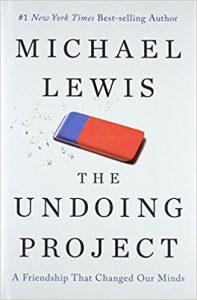Posted by Tom on Monday, Nov 5, 2018
If you’re a reader of nonfiction, there’s a good chance you’ve read something by Michael Lewis. The Big Short, The Blind Side, and Moneyball are three of his books (all good reads) that have been made into movies.

His The Undoing Project: a Friendship that Changed Our Minds probably isn’t going that route. If it were a television series, it would be sort of like Masters of Sex but without the sex. There would be theories about cognitive errors, experiments to test the theories, and then papers written and talks given...no one would watch it. So the subject of our thinking being off and certainty unwarranted runs through a lot of the author’s works. And, again if you’re a reader of nonfiction and a browser of library shelves, you know these topics are popular and have been for a long time. Thomas Gilovich’s How We Know What Isn’t So: the Fallibility of Human Reason in Everyday Life is the first I remember reading, and that was more than 20 years ago. ICPL no longer has it, but there’s interlibrary loan and Wikipedia (RIP Alan Rickman).
Well, coincidentally, Gilovich was a student of and a collaborator with Amos Tversky and Daniel Kahneman. Those two are the subjects of the book, and it’s their friendship to which the subtitle refers! Big confession: I didn’t find all the time Lewis spent on Tversky and Kahneman’s friendship and collaboration all that interesting. If I knew them personally, then sure. Or if I were a brilliant academic who worked with someone my opposite in personality but also brilliant, and our being opposites yet super into each other made the fruit of our labors that much more original and delicious, then okay. Alas, no.
Their early lives (first 100 pages or so) are fascinating and worth reading about. And if you’ve read little or none on decision making and how our thinking is off (woven throughout the book), then all of that is super interesting too. The “undoing” in the title refers to a couple of things. One is Tversky’s and Kahneman’s work to undo our beliefs on the reliability of human judgment and intuition when making decisions.
The other reference is more specific and has to do with the power of unrealized possibilities to contaminate our minds. The extent to which we can plausibly imagine other lives for ourselves is bounded by what our imaginations can undo in our real lives. The imagination creates an alternate history or a counterfactual. Those imagined histories then stick around and influence our thinking and decision-making. I guess I’d rather my mind did a little less undoing. It rarely leads to anything good.


Added by Tom